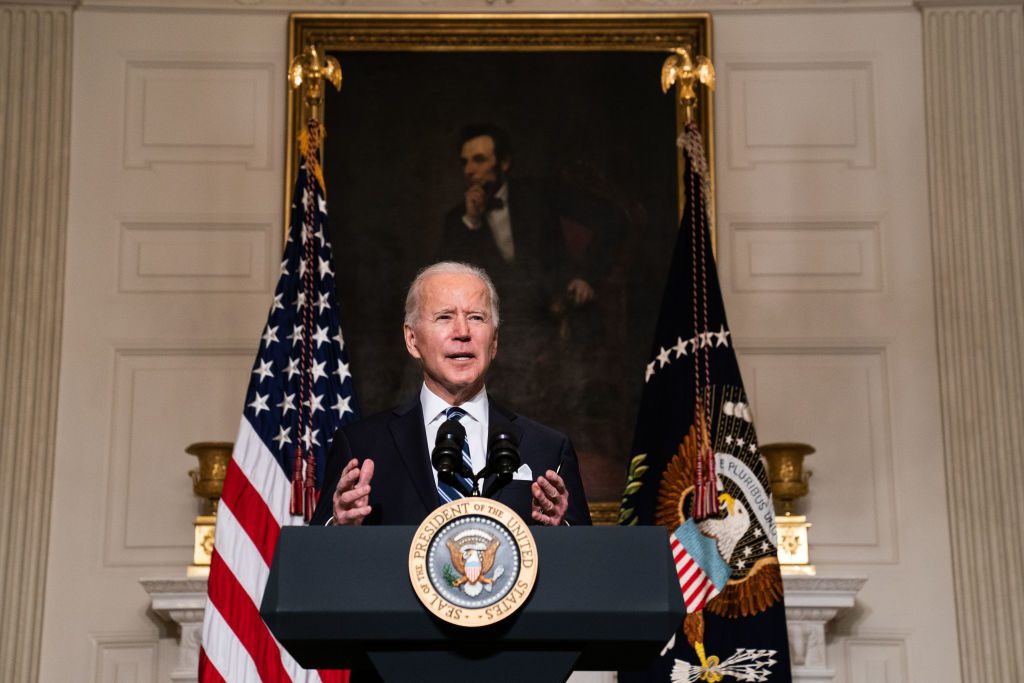Here’s the Deal

Three hundred and sixty-four days after the World Health Organization declared a global pandemic and President Donald Trump explained, from the Oval Office, “our nation’s unprecedented response to the Coronavirus outbreak that started in China,” his successor Joe Biden said that “scientists have made clear that things may get worse again.”
For the first time as president, Biden reprised the role he has played so often, but never so prominently: a tribune from the white, middle class, reporting candidly the consensus of the Democratic Party and American elite, which he now personifies. He didn’t use the phrase he so often employed as vice president, as senator, and on the campaign trail (such that it was) that made him president, but he may as well have titled his speech: “Here’s the deal.”
To start, President Biden, whose inaugural emphasized “unity,” made clear the realities: He disapproved of his (nameless) predecessor whose administration was “hit with a virus that was met with silence and spread unchecked, denials for days, weeks, then months” and he was more than happy to sign “into law the American Rescue Plan, an historic piece of legislation that delivers immediate relief to millions of people. It includes $1,400 in direct rescue checks, payments,” with nary a Republican vote, with a quick-and-dirty near-$2 trillion dollar price tag.
Second, though the virus was apparently “unchecked” for “months,” Biden touted continuity with that approach’s architect: “Listen to Dr. Fauci.” Without missing a beat, a man only 50-odd days in office reported: “This country will be vaccinated soon.” As President Trump lurks in the shadows of Florida palm trees, President Biden left no doubt the enmity between the two men is marrow deep—especially as Trump wields continued political muscle and is holding out hope for a comeback to the faithful.
Added in: the president also addressed implicit critiques of the course the United States has taken these last 12 months.
“Photos and videos taken in 2019 feel like they were taken in another era,” the president said, and “vicious hate crimes against Asian Americans who have been attacked, harassed, blamed, and scapegoated” are unacceptable. He did not address critiques that the establishment overreached in its in COVID-19 response, with devastating side effects, or make the case to the public for his administration’s daily emphasis on “equity,” also a fad in corporate America, and “equity, of course, is a word that meant ‘the quality of being fair and impartial’ that has been twisted to mean something closer to its opposite,” the writer Wesley Yang argues.
Moving along, Biden didn’t use their names, but made plain his desire to be the heir in spirit to the president of his birth, Franklin Delano Roosevelt, and the one at the time of his coming of age, Lyndon Baines Johnson, both giants of Democratic Party history. Both were swept into power amid tragedy and turbulence, and both eventually achieved that status of national father—Roosevelt triumphantly, Johnson far more unevenly.
In laying out his plan, what Biden evoked, so far, would seem far more Johnsonian.
From (unmentioned) strikes on Syria to a rescue program with Great Society panache—it “will cut child poverty in half, according to the experts” he reported—Biden confirmed a fair, basic approximation for his presidency. Not FDR, nor a Reagan for the left, as is bandied, but LBJ: a self-made stalwart of the system, a war president, a race president, a spending president, and though a centrist—a partisan president. He is a man bespokely gifted, a man who most unusually triumphed, but also a man, like Johnson, likely incapable of locking the right out of power for a generation. Biden even alluded to the kind of seeds of defeat that eventually befell Johnson, who eventually composed a tearful epilogue from the White House, passing on re-election. In announcing a positively throwback, whistlestop tour of the country, the president said he will speak “directly to you.” Biden pledged “to tell you the truth about how the American rescue plan meets the moment, and if it fails, I will acknowledge that it failed.”
He promised it won’t.
Biden said some sense of normalcy—the normalcy he once promised, before the pandemic, as the ultimate centrist triumphant in a Democratic Party lunging left—would resume by July 4. If Biden meets his own promise, of universal vaccine access for all adults by May Day, it will be a jubilant summer.
But as the new president said Thursday that history will record we “overcame one of the toughest and darkest periods in this nation’s history,” before adding, “the darkest we’ve ever known,” hours before, his Department of Defense spokesman attacked a talk-show host, at the moment hardly a peer, but a fellow American with millions of followers, and a potential 2024 rival, and he did this straight from the Pentagon, the cerebrum of this country’s military. “We need to remember the government isn’t some foreign force in a distant capital. No, it’s us. All of us. We, the people.”
As the city of Washington remains as militarized as any time since the Civil War, a response to what the government deems the preeminent challenge of domestic extremism, demonstrating unity may yet be the heaviest lift of all. Donald Trump didn’t come out of nowhere, and his presidency, even his lust for a comeback concedes, hardly solved the problems which gave occasion to his rise.
This time came from that time.
Comments